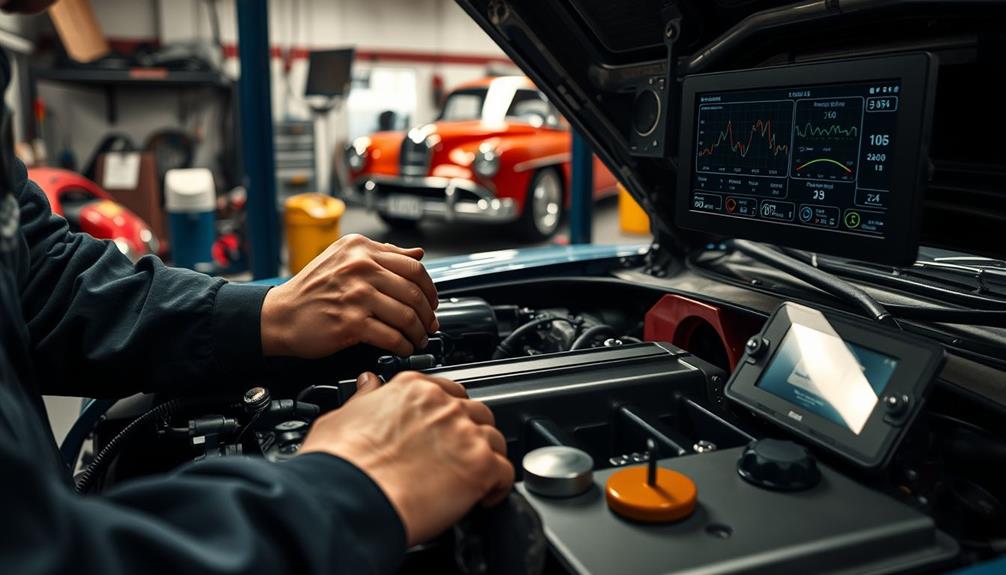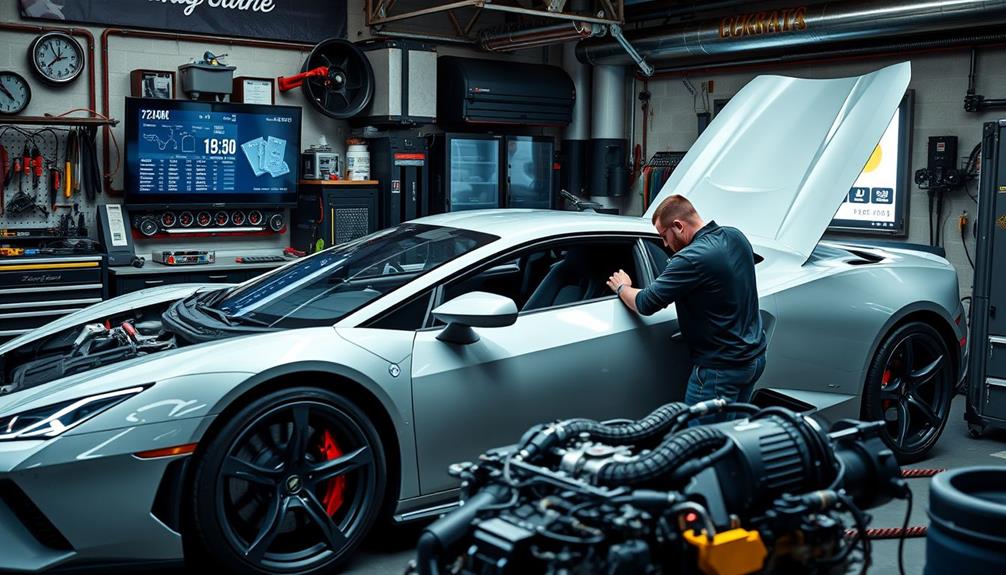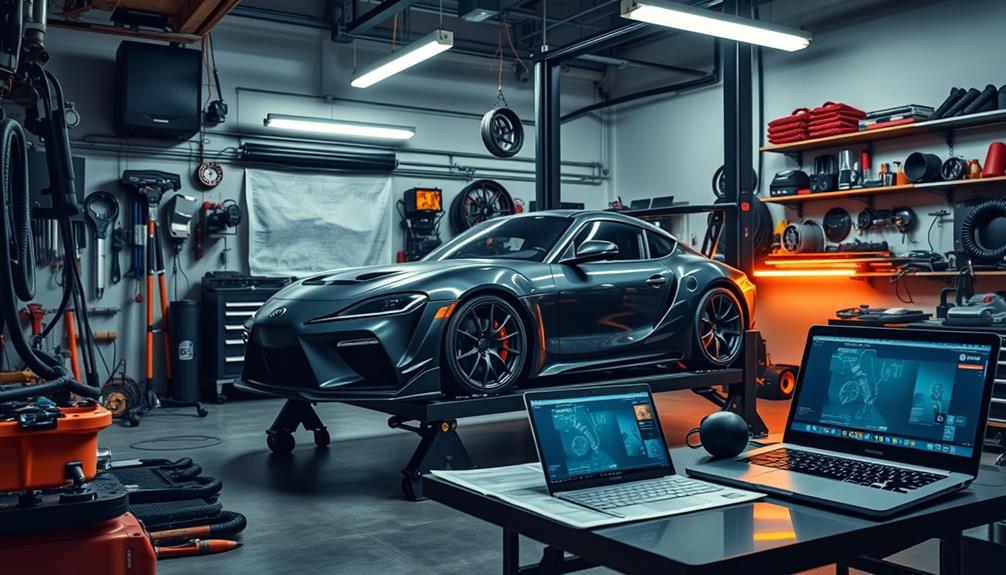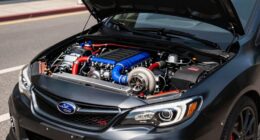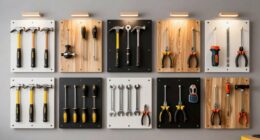A car tune-up consists of several key maintenance tasks to keep your vehicle running at its best. You'll replace spark plugs and ignition wires, check and change filters, and inspect belts and hoses. These tasks prevent engine misfires, improve fuel efficiency, and enhance overall performance. You should also monitor fluid levels and replace them as needed. By scheduling a tune-up every 6 months or 5,000 miles, you'll address minor issues before they become major problems. Want to know more about the specific tasks and their benefits? There's plenty more to uncover!
Key Takeaways
- A car tune-up involves replacing essential parts like spark plugs, ignition wires, and filters to maintain engine efficiency.
- Regular checks of the ignition system, including coil packs and distributor caps, ensure optimal engine performance.
- Cleaning fuel injectors and replacing fuel filters help maintain clean fuel delivery and improve engine responsiveness.
- Inspecting and replacing air filters contribute to better airflow, enhancing engine performance and fuel economy.
- Routine maintenance checks of belts, hoses, and fluid levels prevent potential breakdowns and extend vehicle longevity.
Definition of a Tune-Up
Understanding a tune-up involves recognizing its evolution from simple ignition system adjustments to an all-encompassing approach to vehicle maintenance. Initially, tune-ups focused on maximizing ignition systems, but now they serve as indispensable routine maintenance to keep your vehicle running smoothly.
During a typical tune-up, you'll see checks and replacements of significant components like spark plugs, air filters, and fluid levels. These tasks guarantee peak engine performance, which is essential for any driver. Recommended intervals for tune-ups are generally every 6 months or 5,000 miles, helping you prevent minor issues from escalating into major problems and enhancing your vehicle reliability.
Moreover, following these recommended intervals not only keeps your engine performing its best but also improves fuel efficiency. Regular maintenance guarantees that your car runs efficiently, saving you money at the pump in the long run.
While basic tune-ups can cost between $40 to $150, more specialized services may range from $200 to $800, depending on your vehicle's complexity. Investing in regular tune-ups pays off by extending your vehicle's lifespan and maintaining its overall health.
Signs You Need a Tune-Up
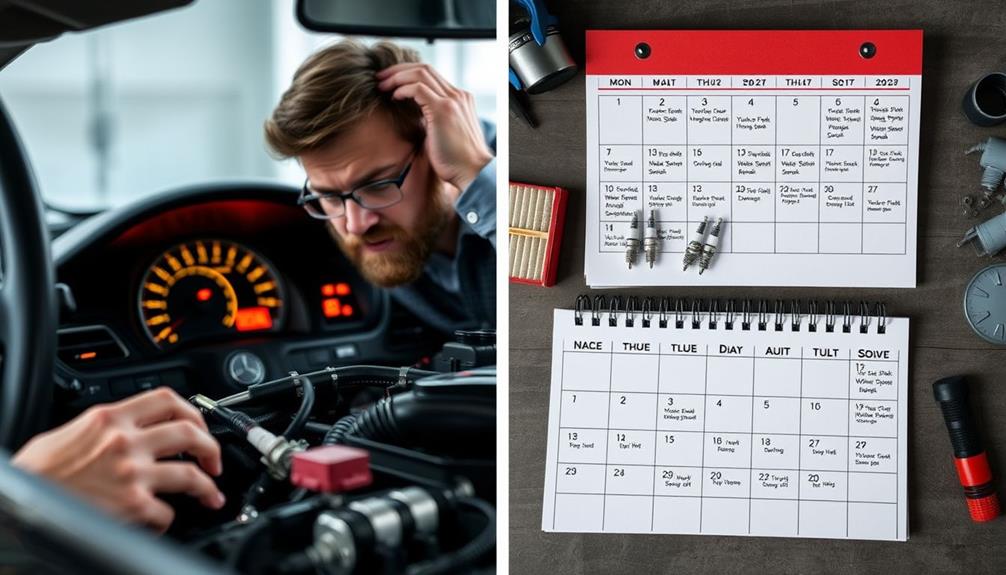
Recognizing the signs that your vehicle needs a tune-up can save you from costly repairs down the road. Your car may be trying to tell you something, and ignoring these signals can lead to bigger issues.
Here are some signs to watch for:
- The check engine light is on, indicating potential underlying issues that need attention.
- You notice rough idle or reduced engine performance, such as sluggish acceleration, which can signal inefficiencies that a tune-up service can correct.
- A significant decrease in fuel mileage could mean your spark plugs and wires/coil need replacing or that there are problems with your ignition system.
Other warning signs include knocking noises from the engine, suggesting mechanical problems, and frequent stalling, pointing to ignition or fuel system issues.
Ignoring these symptoms can lead to engine misfires or even more serious damage. Regular tune-ups not only enhance your vehicle's reliability but also guarantee peak performance.
Don't wait for the problem to escalate—if you notice these signs, it's time to schedule a tune-up.
Key Components of a Tune-Up
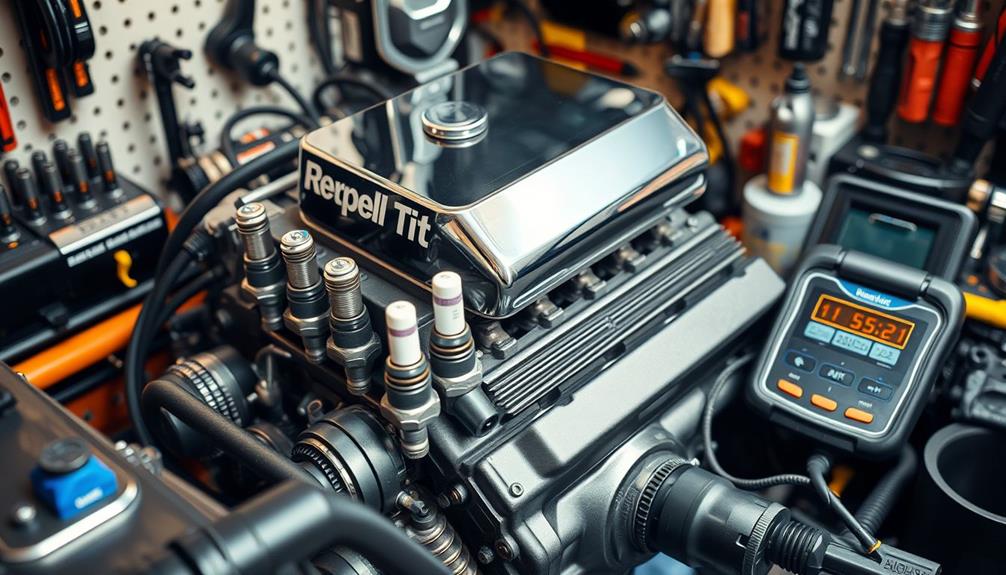
When you get a tune-up, replacing essential parts is key to keeping your car running smoothly.
You'll see improvements in performance and efficiency, which can save you money in the long run.
Let's explore the specific components that make a big difference during a tune-up.
Essential Parts Replacement
Guaranteeing your vehicle runs smoothly involves regular replacement of essential parts during a tune-up. Key components like spark plugs, ignition wires, and filters play a critical role in maintaining your engine performance.
Here are some essential parts to take into account:
- Spark Plug Replacement: Replace spark plugs every 30,000 to 40,000 miles for ideal ignition of the air-fuel mixture. Platinum and iridium plugs can last considerably longer, up to 160,000 km.
- Ignition Wires: These wires transfer electricity to the spark plugs and may degrade over time due to heat and oil exposure. Replacing them alongside spark plugs enhances engine efficiency.
- Positive Crankcase Ventilation (PCV) Valve: This valve recycles combustion gases, reducing emissions. Regularly replacing it, ideally during spark plug changes, prevents potential performance issues.
Additional replacements like fuel and air filters guarantee clean airflow and fuel supply, while coil pack boots should also be replaced to avoid misfires.
Performance Enhancements and Benefits
After replacing key components during a tune-up, you'll notice significant performance enhancements that can make a real difference in your vehicle's operation. This maintenance procedure focuses on several crucial parts that directly impact engine performance.
| Component | Benefits |
|---|---|
| Spark Plugs | Guarantees efficient ignition, improving fuel combustion. |
| Ignition Wires | Prevents misfires, maintaining smooth engine operation. |
| Engine Air Filter | Enhances airflow, boosting overall engine efficiency. |
| Fuel Filter | Keeps contaminants out, guaranteeing clean fuel delivery. |
| Fuel Injection | Cleans injectors for better responsiveness and power. |
Replacing spark plugs every 30,000 to 40,000 miles is critical for peak performance. Ignition wires and coil pack boots facilitate the proper transfer of electricity, preventing misfires. Regularly changing the engine air filter and fuel filter keeps your engine clean and enhances fuel economy. Additionally, cleaning the fuel injection system during your tune-up helps maintain injector efficiency, further boosting engine performance. By addressing these components, you'll make certain your vehicle runs smoothly and reliably for longer.
Importance of Regular Maintenance

Regular maintenance isn't just a suggestion; it's essential for preventing major repairs down the line.
By staying on top of tune-ups and checks, you can enhance your vehicle's longevity and keep it running smoothly for years.
Ignoring these practices could lead to costly issues that could've been easily avoided.
Preventing Major Repairs
A well-maintained vehicle is your best defense against costly repairs down the road. Regular maintenance, including tune-ups, plays an essential role in enhancing your engine's performance and fuel economy by 4-12%. By sticking to the manufacturer-recommended maintenance schedule, you can avoid unexpected breakdowns and guarantee reliability.
Additionally, performing regular checks can help prevent issues similar to how potential side effects and interactions of cold medications can arise from neglecting health care routines.
Preventive maintenance checks are vital. They help identify potential issues before they escalate into major repairs, saving you both time and money. Here are some key components to focus on:
- Inspecting filters for ideal airflow and fluid cleanliness
- Checking belts and hoses for wear and tear
- Monitoring fluid levels to prevent strain on your engine
Neglecting routine maintenance can lead to severe engine damage. Problems like worn spark plugs or low fluid levels can gradually affect your engine's performance.
Enhancing Vehicle Longevity
Maintaining your vehicle isn't just about avoiding breakdowns; it's vital for extending its lifespan. Regular tune-ups and diligent vehicle maintenance guarantee that all engine components function efficiently, preventing small issues from escalating into major problems. By sticking to a maintenance schedule—typically every 6 months or 5,000 miles—you can greatly enhance your vehicle's longevity.
Additionally, just as with personal finances, establishing a budget for regular maintenance can help you avoid unexpected repair costs and keep your vehicle in top shape (financial mistakes to avoid).
Addressing minor performance issues early, like reduced mileage or unusual engine noises, can save you from costly repairs down the line. Regular tune-ups not only improve your driving experience but can also enhance fuel efficiency by 4-12%. This improvement in fuel economy means you spend less on gas, keeping more money in your pocket.
Moreover, consistent maintenance practices positively impact your vehicle's resale value. A well-maintained car often attracts higher offers in the used car market, making it a smart investment for the future.
In short, prioritizing regular vehicle maintenance not only keeps your car running smoothly but also guarantees it lasts longer, providing you with reliable transportation for years to come.
Ignition System Maintenance
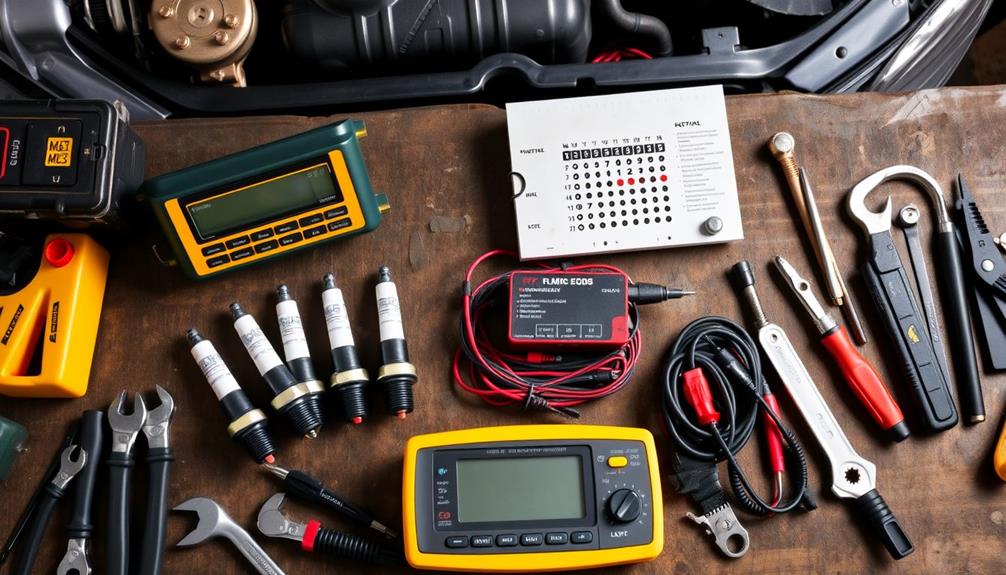
The ignition system is an essential component of your vehicle's performance, and keeping it in top shape can save you from future headaches. Regular maintenance of this system guarantees that your engine runs smoothly and efficiently, preventing potential engine issues down the road.
To maintain your ignition system, follow this maintenance checklist:
- Replace spark plugs every 30,000 to 40,000 miles to avoid misfires and guarantee peak performance.
- Inspect and replace ignition wires as necessary, since wear from heat and oil can lead to performance loss.
- Check coil packs for wear, as they convert low voltage to high voltage for spark plugs; any worn components should be replaced.
If your vehicle has a distributor cap and rotor, replace them together to maintain ignition efficiency, especially in older models.
Neglecting these components can place extra strain on the engine, leading to costly repairs. By prioritizing ignition system maintenance during your tune-up, you'll help prolong the life of your engine and enjoy a smoother driving experience.
Filter and Fluid Importance
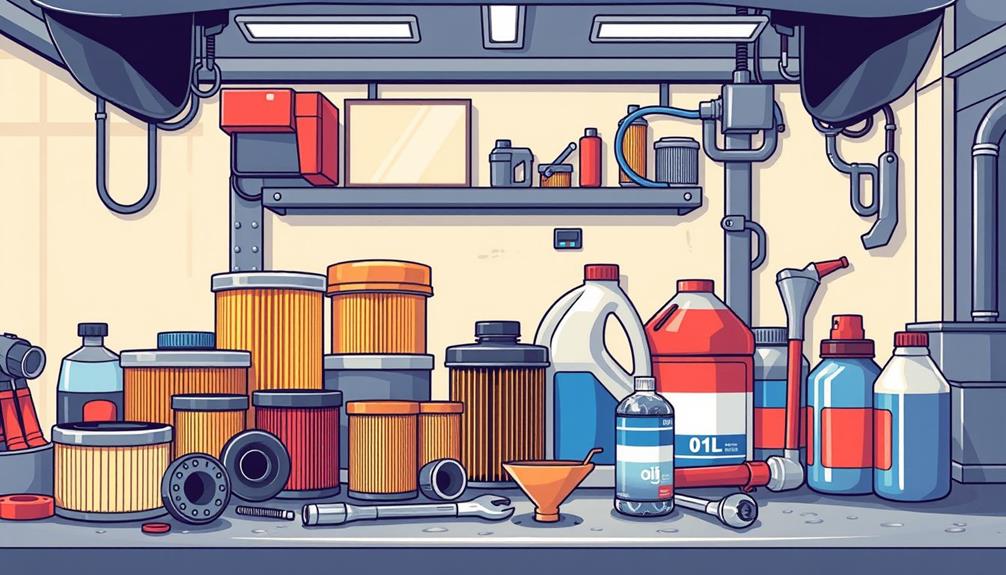
Clean air filters are essential for keeping your engine running smoothly and efficiently.
When you neglect them, you risk lowering your fuel efficiency and overall performance.
Regular fluid changes also play a vital role in your vehicle's health, preventing costly repairs down the line.
Clean Air Filters
Air filters play an essential role in your vehicle's overall performance and efficiency. Clean air filters prevent harmful contaminants from entering the engine, which helps maintain peak engine performance and fuel efficiency.
When you neglect to replace air filters, you risk reduced engine power and efficiency, potentially losing up to 10% in fuel economy.
To keep your vehicle in top shape, consider these maintenance tips:
- Replace air filters every 15,000 to 30,000 miles, following manufacturer guidelines.
- Monitor driving conditions; dusty or polluted environments may require more frequent changes.
- Check cabin air filters to enhance air quality inside your vehicle.
Failing to replace air filters can lead to increased engine wear and costly repairs down the line, as contaminants can cause damage over time.
By staying on top of your vehicle maintenance and ensuring you have clean air filters, you'll not only enjoy better fuel efficiency but also prolong the life of your engine.
Essential Fluid Changes
Maintaining your vehicle's essential fluids is important for ideal performance and longevity. Regular oil changes are critical, particularly with synthetic oils that can last between 7,500 to 15,000 miles. Fresh engine oil prevents wear and keeps your engine running smoothly.
It's also significant to address your brake fluid, coolant, and transmission fluid; contaminated fluids can lead to excessive wear on engine components, jeopardizing your vehicle's health.
Don't overlook the fuel filters, either. They're necessary for removing impurities from fuel, and neglecting their replacement can stress your engine and diminish performance over time.
Additionally, make sure to replace your air filter regularly to guarantee clean airflow into the engine, as a dirty filter can drastically reduce fuel efficiency.
Lastly, check your PCV (Positive Crankcase Ventilation) valve. A faulty PCV valve can disrupt engine operation and increase emissions, so it should be replaced as needed.
Belts and Hoses Checks
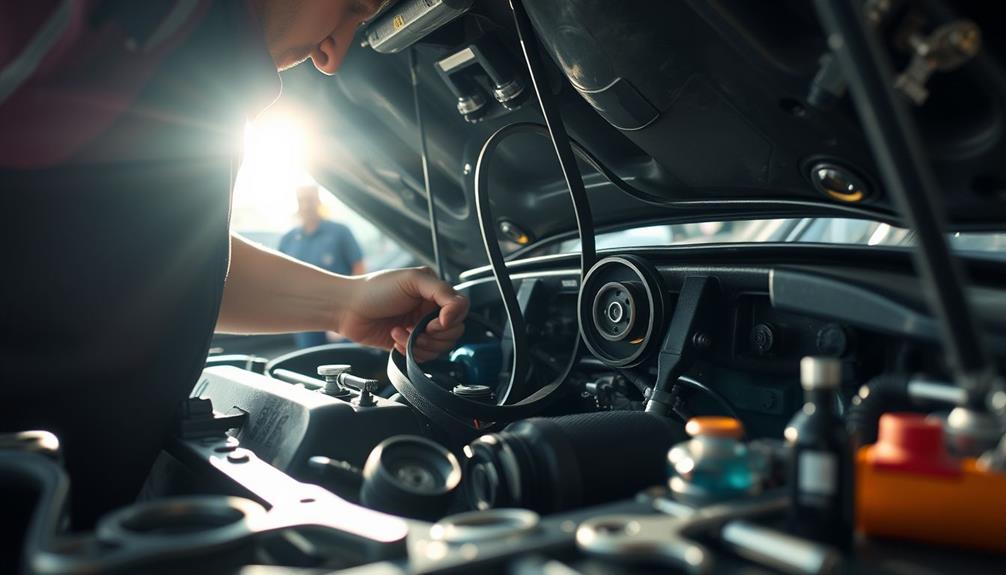
Your vehicle's belts and hoses play an essential role in its overall performance and reliability. Regular inspections are important to guarantee that these components function properly and to prevent costly repairs.
Belts, including timing belts and serpentine belts, typically last between 50,000 to 100,000 miles, but you should check them for signs of wear such as cracks and fraying.
Consider these key points during your maintenance:
- Timing Belt: Replace every 80,000 to 100,000 miles to avoid severe engine damage.
- Serpentine Belts: Inspect for wear and cracks, as they power multiple engine accessories.
- Hoses: Look for leaks, swelling, or roughness; these can indicate potential failure.
Safety Maintenance Practices
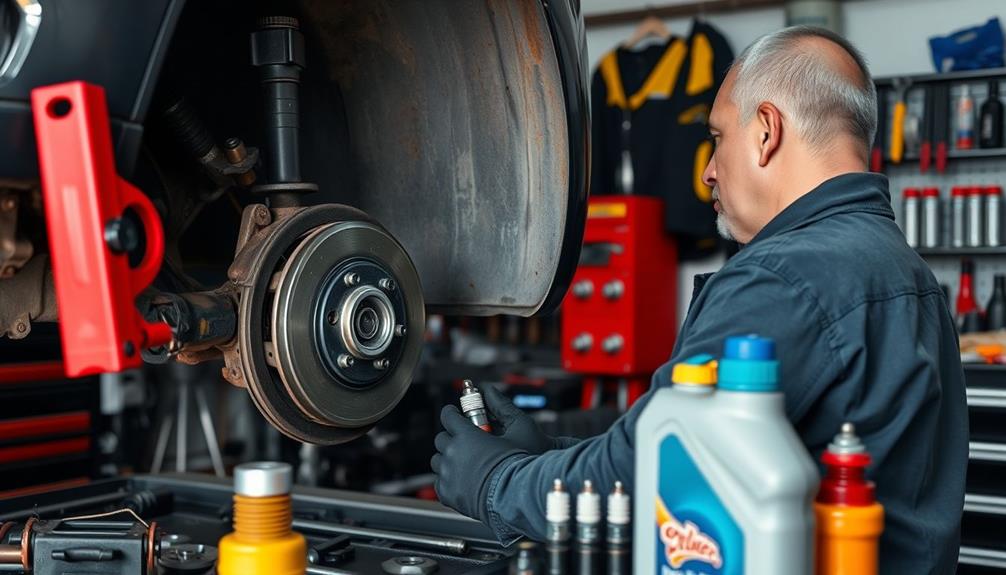
Safety is paramount when performing vehicle maintenance, and following best practices can prevent accidents and injuries. Before you immerse yourself in any maintenance tasks, always disconnect the negative battery cable. This simple step can protect you from electrical shock and prevent the vehicle from starting unexpectedly.
Next, make certain you're equipped with proper personal protective equipment (PPE). Wearing safety glasses and gloves shields you from harmful substances and flying debris.
Additionally, verify the vehicle is securely chocked and on a stable surface before using jacks or jack stands; this precaution is vital for your safety.
Regularly inspect and maintain your tools and equipment to guarantee they're in good working condition. Using faulty tools can lead to accidents that could have been easily avoided.
Always refer to your vehicle's service manual for specific safety precautions and maintenance guidelines tailored to your car.
Choosing a Repair Shop

Finding the right repair shop can make all the difference when it comes to vehicle maintenance. You want to guarantee your car receives the best care possible, which starts with thorough research.
Check customer reviews and ratings to gauge the quality of service at various repair shops. Look for shops that boast relevant certifications, indicating their technicians possess the expertise needed for your vehicle's needs.
When choosing a shop, consider the following:
- Specialization: Some repair shops focus on specific makes or models, offering enhanced knowledge and experience.
- Detailed Estimates: Always request estimates and service descriptions upfront. This transparency helps you compare options and make informed decisions.
- Convenience: Utilize shops that offer online scheduling for hassle-free appointment booking.
Cost of a Tune-Up
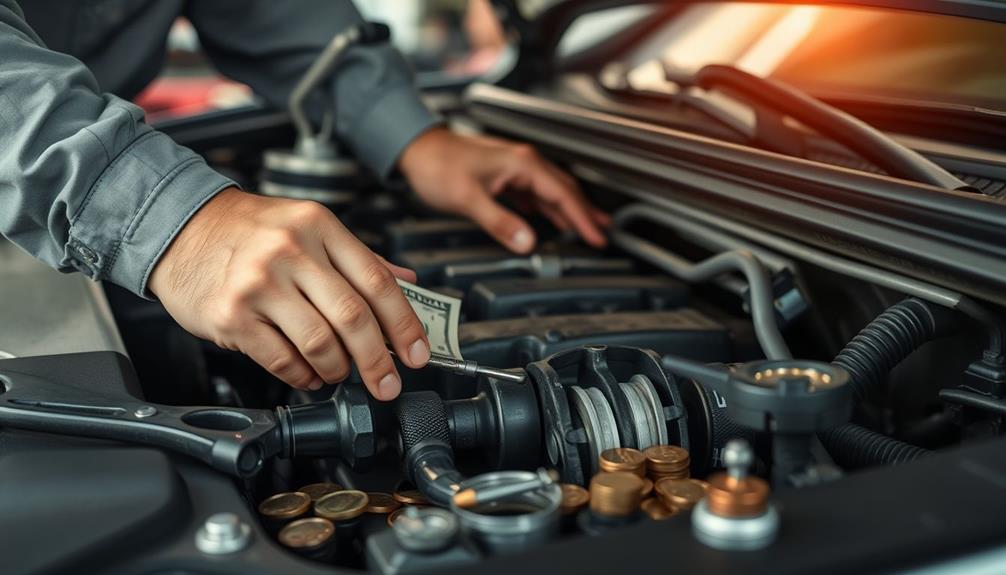
When it comes to the cost of a tune-up, understanding the potential expenses can help you budget effectively.
For a minimal tune-up, you're looking at a range between $40 and $150, depending on the services included and your vehicle's make and model.
If you need a specialized tune-up that involves more complex procedures and parts, expect to pay anywhere from $200 to $800.
Routine labor costs for tune-ups typically run between $105 and $175 per hour. A basic tune-up usually requires about 1.5 hours of labor.
Additionally, spark plugs can cost you between $5 and $15 each, adding to your total parts cost, which can range from $15 to $120 for replacing 4 to 8 plugs.
Frequently Asked Questions
What Does a Full Tune-Up Include?
A full tune-up includes replacing spark plugs and ignition wires, changing filters, checking fluids, and inspecting belts and hoses. You'll guarantee your engine runs smoothly and efficiently, preventing potential issues down the road.
What Is the Average Cost of a Full Tune-Up?
The average cost of a full tune-up ranges between $192.50 and $442.50. This includes both parts and labor, with basic services like spark plug replacements and oil changes contributing to the final price.
How Long Does a Car Tune up Take?
Did you know a standard car tune-up usually takes one to two hours? Depending on your vehicle's complexity and the tasks needed, it could take longer. Scheduling ahead helps set realistic expectations for your appointment.
What Happens to Your Car After a Tune-Up?
After a tune-up, you'll notice improved engine performance and better fuel efficiency. Routine checks can catch minor issues before they escalate, ensuring your car runs smoother and lasts longer, saving you money on repairs.
Conclusion
In the grand symphony of car maintenance, a tune-up is the conductor that guarantees every part plays in harmony. Regular tune-ups keep your vehicle running smoothly and prolong its life, just like a well-tuned instrument. By staying on top of signs that you need a tune-up and understanding its key components, you're not just maintaining a car—you're investing in a reliable partner for your journeys. So, treat your ride to a tune-up and enjoy the smooth drive ahead! To ensure your vehicle stays in top shape, it’s important to also follow some key car maintenance tips. Regularly checking and changing your oil, inspecting and replacing air filters, and monitoring tire pressure and tread are all essential steps in keeping your car running at its best. By combining these practices with regular tune-ups, you’ll be setting your vehicle up for a long and reliable road ahead.


